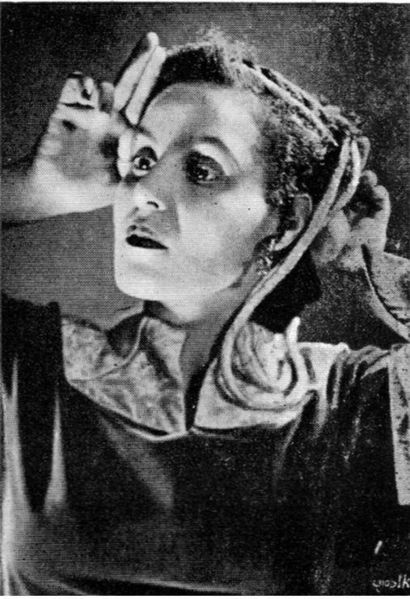http://m.forward.com/blogs/sisterhood-blog/188652/q-and-a-orthodox-singing-sensation-ofir-ben-shitr/
Singer, dancer, and “cultural mediator” Bracha Zefira (1910-1990) appears prominently in both of our textbooks. Her musical performances and recordings remain, however, rare to find.

Israeli singer of Jewish-Yemenite origin, Bracha Zefira, in the 1930s. By אלמוג at he.wikipedia [Public domain], from Wikimedia Commons
Zefira was “born in a Yemenite family in Jerusalem.” (Hirschberg: 187). An orphan since a very young age, she received a school education first in Jerusalem, then in a boarding school, and eventually at the Palestine Conservatoire and Menachem Gnessin’s theater school. She moved to Berlin in 1930, where she studied theater and met Nachum Nardi, a Russian Jewish pianist. Together they toured Europe and North Africa, presenting a program that
consisted of three ethnic divisions of songs–Yemenite, Bedouin, Sephardi–as well as children’s songs by Nardi. Piano pieces, such as a Gavotte by Gluck and a Rhapsody by Liszt served as piano interludes. […]
Zefira and Nardi returned to Palestine in 1930 and immediately set up a busy schedule of public concerts. Zefira’s reputation abroad did not prevent initial difficulties; for instance, the owner of a Tel Aviv apartment refused to rent it to a Yemenite, an action resulting in angry press rebuke. […]
Zefira’s repertory and performance style caught the self-confident western-educated critics in Palestine by surprise. David Schor, devoted as he was to the cause of Jewish folk song, criticized Zefira’s oriental quality of voice, claiming that ‘she has no voice, and what little she has is blighted by the intonation characteristic of Yemenite, Sephardi, and Arabic singing.’ […]
Members of the Sephardi community, on the other hand, immediately realized the unifying social potential of Zefira’s contribution. […]
A new stage [was] reached with Zefira’s participation in the momentous inauguration broadcast of the PBS in March 1936 which marked the official recognition of the East by the establishment. […] The increased public exposure raised the issue of the purity of the ancient and proud tradition. […]
While the purists were on guard protecting the genuine heritage, the fierce protectors of the Hebrew language unexpectedly re-emerged in August 1939 and fired from the opposite direction [with] a lst-minute ban on the concert because of the inclusion of two Sephardi songs in [Judeo-Spanish] (Ladino) in the otherwise Hebrew programme. (Hirschberg)
In 1937, Zefira and Nardi signed a contract with Columbia Phonograph and went on a tour in the United States, after which the couple separated. Zefira went on to collaborate with members of the Palestine Orchestra (eventually performing with the orchestra in the 1939 Summer Series), and toured Palestine with pianist and composer Paul Ben-Haim.
This week, we confront the diversity of music in Israel by learning about the traditional song of the women from the Jewish community of Kerala (South India), and how this unique repertoire (sung in Jewish-Malayalam) has been reconstructed in Israel, on the basis of manuscript sources and ethnographic field work.
[youtube http://www.youtube.com/watch?v=ha91MldHZb4]Our guest lecturer is Barbara C. Johnson, Emerita Professor of Anthropology at Ithaca College. Upon completing her B.A. in history at Oberlin College, Barbara Johnson lived and taught in South India for four years during the 1960s, before beginning academic research on the Kerala Jews leading to her M.A. in religion (Smith College) and Ph.D.in anthropology (University of Massachusetts). Since 1972 she has made six trips back to India and twenty to Israel (including two years of residence) for ethnographic fieldwork with their community in both places. Johnson’s publications include Oh Lovely Parrot!: Jewish Women’s Songs from Kerala (Book & CD: Jewish Music Research Center, Jerusalem, 2004); Ruby of Cochin: An Indian Jewish Woman Remembers (co-authored with Ruby Daniel: Jewish Publication Society, 1995); and many scholarly articles. She is currently a Visiting Scholar in the South Asia Program at Cornell University. She recently served as visiting scholar, assisting in the preparation of the exhibition, Global India: Kerala, Israel, Berkeley, which I (Francesco Spagnolo) curated, on view at The Magnes, UC Berkeley, in the Fall of 2013.




